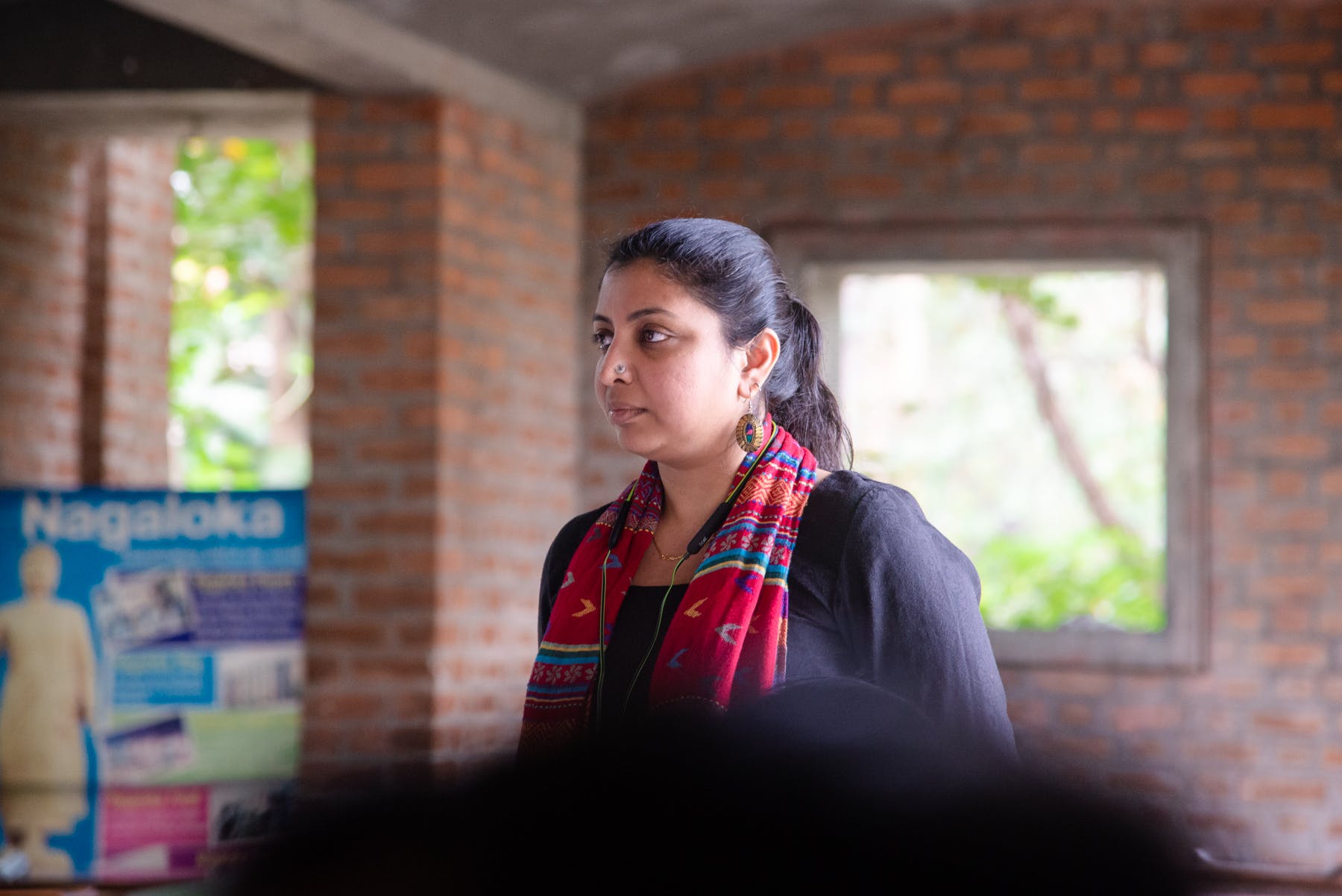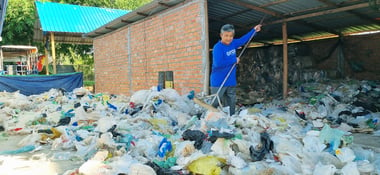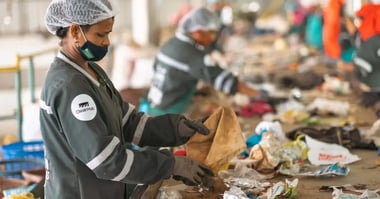
Beth Howell
Beth has been writing about the environment and climate change for over four years now – with her work being featured in publications such as The BBC, Forbes, The Express, Greenpeace, and in multiple academic journals.
Before she joined CleanHub, Lakshmi Menon was working at Hasiru Dala Innovations — a waste management company in Bengaluru, Karnataka.
Hasiru Dala Innovations is a social enterprise that works to enhance the lives of traditional, informal waste pickers through the creation of enriched livelihoods. This way, employees can live a life of dignity.
To learn more about informal waste management, we spoke with Lakshmi about her experiences in the sector and the working conditions of waste pickers in India. Here's what she had to say.
Q. How does the waste management system work in India?
A. We have this culture of Kabadiwalas, which is basically a network of people who are informal waste pickers who collect waste from the roadside.
There is this entire chain of people who have small shops and aggregate certain kinds of recyclable waste, which can be glass, paper, or even plastic. For every category of waste, there is a Kabadiwala chain.
I think a big issue that has developed over the last few decades is how plastic usage has exploded across India and the rest of the world.
In India, we don't have a plastic waste processing facility that is accessible for every 50-kilometer square space, which is a huge concern. There is informal recycling in the communities, but it is not done safely, and nor are environmental safety standards met.
Q. What's the difference between informal and formal waste management?
A. When you say formal working, it’s an organization that complies with all laws and regulations for staff and facilities.
Say you're working in a private limited company, then there are laws of the state that govern how you are paying wages for the workers. How are you creating a work environment for the workers? Where is your office located?
When it comes to an informal working system, most of these things are not fully compliant. The workers are not always under payroll, so they're not getting minimum wages as per the state.
Each of these informal workers suffers some of the other kinds of oppression from the systems, which are trying to cut costs, make a profit, or just be able to get away from compliance.
The other thing that comes with informal workers is that it's very difficult to identify how many there are in a sector. There’s no governing body that has a list of the number of workers in each organization because they’re not on any official payroll.
It’s a problem that is very systemic in India because we've always had this idea of help around the house. A lot of people live in poverty, so they often take on informal jobs to get money. They're not aware of the benefits of formal work and they don't get those benefits.
Q. Who are the people typically working in waste management?
A. There are two kinds of people working in waste management.
If you take an urban scenario, there are people who have been working in the waste management line for at least a couple of generations. They are communities that have been around in our city.
Here, there is this issue of where we have this waste system, and there are valid people who generally work a lot more in the waste management field.
Second, in most places are migrant workers who have temporarily come to work for better employment opportunities or better wages. Either they don’t have much land to do agriculture themselves, or they've come because they feel that the city will have better, more varied opportunities.
Waste management becomes one of the easiest routes because you don’t need a lot of skills.
Q. What did Hasiru Dala do to change this?
A. A couple of things that Hasiru Dala did very differently was being able to just get people to come together as a community and really look at policy-level changes that can happen.
There are a few cities in India that really made a huge shift in waste management. Bangalore is one city where we have room for segregated waste in households and any place.
After having policy changes, we started working on trying and getting more and more waste pickers to work for the city. What was important was getting the city's governance to understand that there are so many people working in waste already and that they need to be in the system.
We have a decentralized waste management system, and the recyclable waste comes from every geographical location — a ward, as we call it. We have 192 wards and each of those wards will have a recycling waste center. We call it a dry waste collection center. That entire operation is preferably done by people who are identified as waste pickers.
Hasiru Dala helped in creating this identity card, where people from communities can get this card which helps them get access to these centers and work from these centers.
That was almost three years of work to get all of these things done. But the number of waste pickers in a city like Bangalore is 30,000 to 40,000. So, just having 4 or 5 people working in 200 centers will hardly make an impact. We needed scalable solutions, where the city's waste is much higher than that.
Q. What are the challenges of someone going from informal waste management to the formal sector?
A. Most people who are working in such places are not introduced to any kind of formal system. Be it education, health, or any way in the community or the state accepts them. They don't understand and they don't trust that going into a formal system would be different.
A simple example: say there's this person who comes to my house to help clean the house, and she does not have a bank account. I keep telling her, "Get a bank account, it will be really helpful for you." The biggest fear that she felt was that she wouldn’t be able to enter because the bank wouldn’t allow her to.
That's her perception of the bank because a formal system is quite alien when it comes to people who are working on the field or the ground.
There are a lot of general things, like: that world is not my world, and I don't trust that world. You're this elite city person who's coming and saying that will change my world, and you don't know anything about me and how I live so, why do I trust you? One of the biggest challenges was getting these workers to trust us and put belief in a formal system.
The second problem is that the informal system, however bad it is, is extremely flexible.
A problem we’ve seen in the past is that if they have a festival or celebration, they’ll take anywhere from a week to ten days off.
They'll say, "Yeah, if we have to come back, we'll come back. Otherwise, we will not come back.” And we'll be like, "Okay, yeah, but we need you back for these certain days. If you come, you'll get your salary." They're like, "Ah, it's okay. I don't want the salary."
When you’re an informal waste picker, you get up in the morning, you feel like going, you go. You don't feel like going, you don't go. You work till four o'clock in the morning, it's okay. You work at noon, it's okay.
It allows a certain kind of ownership to your life and a way that they live that they feel that a formal system is too restricting.
Gaining trust is the most important, and it's very difficult to earn that trust unless you’ve already worked closely with them. With generations of oppression, it’s made these workers skittish - which we understand. I think as a developing nation itself, I can say even if I'm from a city, there's a certain amount of distrust I also have.
Summary
We'd like to thank Lakshmi for taking the time to talk to us about the informal waste sector — an area of the waste industry that needs demystifying.
If you'd like to learn more about how CleanHub opporates in the waste sector, check out the articles below:


.jpg?width=380&name=drone-2021-12-06-10h31m38s177%20(1).jpg)





-2.png?width=380&name=Untitled%20design%20(2)-2.png)
.webp?width=380&name=Sarah-Jeanne-Royer%20(1).webp)
.webp?width=380&name=Small-islands%20(1).webp)

